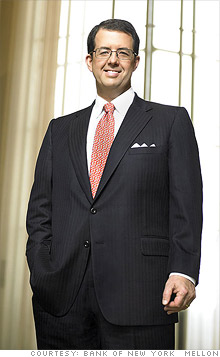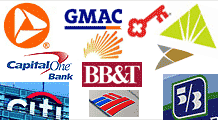Banker: "TARP helped avert a global calamity"
Bank of New York Mellon's CEO sees a brightening picture and credits the government with halting last year's panic.
 |
| New York Mellon CEO Robert P. Kelly. |
NEW YORK (Fortune) -- Bank of New York Mellon is not a name familiar to retail customers, but its role in the financial system is important enough that it was one of the first nine banks persuaded to accept billions of dollars last October from the Troubled Asset Relief Program -- in Bank of New York Mellon's case, $3 billion. The company is the world's largest custodial bank, handling more than $20 trillion in assets for other banks and investors.
In February, federal regulators stress-tested the nation's 19 largest banks and found only three institutions will be profitable in 2010 if the economy gets much worse. Bank of New York Mellon (BK, Fortune 500) would lead that pack, ahead of American Express (AXP, Fortune 500) and Goldman Sachs (GS, Fortune 500). In a recent interview with Fortune's editors, CEO Robert P. Kelly has more praise than criticism for the government's interventions. Excerpts:
Tell us how things are going in banking.
Infinitely better than last fall. Until January or February, many observers thought that the entire banking system was insolvent. After the stress tests, [we saw] that the capital hole wasn't nearly as great as people had feared and that the underlying earnings power of the banks is fairly high. That's why bank stocks rallied as much as they did this spring.
What happened during the stress tests?
It was breathtaking. It culminated in joint sessions of the various regulatory bodies on our premises including the FSA [Financial Services Authority] from the U.K. and the Canadian regulators. Our regulators wanted loan-loss forecasts for the rest of this year and next year using two scenarios: what they expect and then an "adverse case," which was actually, in many ways, worse than the Great Depression. Then they applied haircuts to our revenue estimates and raised expenses to imply capital ratios.
Do you think it was a reasonable test?
Yes. It was materially more conservative than what we expect. Based on our analysis of the 19 firms, in the adverse case, only three would make money, including us.
We were surprised to see you on the TARP list.
It was explained in the [Oct. 13] meeting. They felt we are important to the infrastructure of the payments system of the United States and did not want there to be any questions about our financial viability. We had custody of $23 trillion of the world's securities, and a one-third market share of corporate-trustee activity. We clear over half the securities of the U.S. government. We're important to the overall infrastructure of the financial markets, not just in the U.S. but also around the world.
They very much wanted all the major banks to be part of the program. I understand the U.K. government [had] tried to do essentially the same thing with their banks. Some U.K. banks started to back away from it, and it morphed from an industry shoring up or a "recapitalization" plan to a "rescue" plan. I expect the U.S. did not want that to happen here.
What are you concerned about going forward?
Well, we still have some weak securities on our balance sheet, which were all triple-A when we bought them but some of which turned out to be triple-C in reality. It's manageable, though. We've been profitable for the last six quarters, and we are very liquid with nearly half of our assets in cash and short-term securities. The banks that disappeared lacked liquidity. They were lending long and borrowing short. Later this year, I expect we'll get new proposed standards for capital and liquidity.
Will the required ratio make you less profitable?
I don't think so. There are two key capital ratios: Tier 1 Capital and Tier 1 Common. We have roughly twice the minimum of Tier 1 and Tier 1 Common.
Is Tier 1 Common a new standard?
It's basically common equity divided by risk-weighted assets, which better indicates one's ability to absorb losses. The problem with TARP is that it is preferred equity. It can't absorb losses, because it's debt with a coupon. However, I think it had huge benefits, for a short period of time. We were in a liquidity crisis not seen in almost 100 years in the United States. And so to come out and say, "Here are our biggest financial institutions and we are telling you, United States and the rest of the world, these guys aren't going down," that's very powerful. Particularly outside of the U.S., people said, "Finally, we know who the survivors are." We quickly picked up a lot of deposits and new business. I think people will look back on this five or ten years from now and say that TARP did its job. It helped avert a global calamity.
Have you paid back your TARP money?
Yes. We raised $1.5 billion in uninsured debt, at a much lower rate than TARP and common equity of $1.4 billion, proving that we could access the capital markets. We reduced our dividend, which provided us with another $750 million per year. The sum of those three things is more valuable than having $3 billion of preferred [equity]. Our balance sheet is stronger today than at the time of receiving TARP.
You were pretty impressed with how Washington handled the crisis in the fall. Have you continued to be impressed?
Yes. I was negative initially on the stress test, because going public with it created downward pressure on the stock prices for several months. But in the end, the numbers spoke for themselves and the markets responded.
It seems like one reason why the Public-Private Investment Partnership isn't going forward is because the gulf is too wide between what investors want to pay and what the banks want to sell for.
There's zero liquidity in many of these instruments. If, for example, you own a $100 [mortgage-backed] security and think you're going to get $95 back, it probably trades at $40. The bid-offer spread is huge between what people would be willing to buy and sell at.
But both sides agree on the actual value?
There are accepted ways of determining the expected cash flows on individual securities, which depend upon the default rate and the severity, with generally available data.
You said in your annual report that you've written down $1.6 billion of securities, but you actually thought the loss would be $535 million. Is that still what you think?
Roughly. In the first quarter, we cumulatively had $7.5 billion pre-tax write-downs on marked-to-market securities, which was charged through our capital account. That's why so many financial institutions were capital-short. The accounting has changed. Under the new rules, if a dollar is going to return 99 cents, you only take one cent through the income statement. You still do the other things to the capital account.
I'm a former trader, so I love mark-to-market accounting for traded instruments. But in the banking business, you're holding loans and securities to maturity. You should disclose what the mark-to-market is, so investors are aware, but not through the capital account.
How [else] should the rules be changed?
We are in a global economy. We need global accounting standards. FASB [Financial Accounting Standards Board] should be merged with the International Accounting Standards Board. We need to change the policies that have been major problems in this recession. In good times, we need to be able to build credit reserves. When things are good, the FDIC should be building up premiums too. Finally, we need to consolidate the number of regulators overseeing our industry. There's a lack of accountability, and it is out of line with the rest of the world. ![]()
-
 The retail giant tops the Fortune 500 for the second year in a row. Who else made the list? More
The retail giant tops the Fortune 500 for the second year in a row. Who else made the list? More -
 This group of companies is all about social networking to connect with their customers. More
This group of companies is all about social networking to connect with their customers. More -
 The fight over the cholesterol medication is keeping a generic version from hitting the market. More
The fight over the cholesterol medication is keeping a generic version from hitting the market. More -
 Bin Laden may be dead, but the terrorist group he led doesn't need his money. More
Bin Laden may be dead, but the terrorist group he led doesn't need his money. More -
 U.S. real estate might be a mess, but in other parts of the world, home prices are jumping. More
U.S. real estate might be a mess, but in other parts of the world, home prices are jumping. More -
 Libya's output is a fraction of global production, but it's crucial to the nation's economy. More
Libya's output is a fraction of global production, but it's crucial to the nation's economy. More -
 Once rates start to rise, things could get ugly fast for our neighbors to the north. More
Once rates start to rise, things could get ugly fast for our neighbors to the north. More








